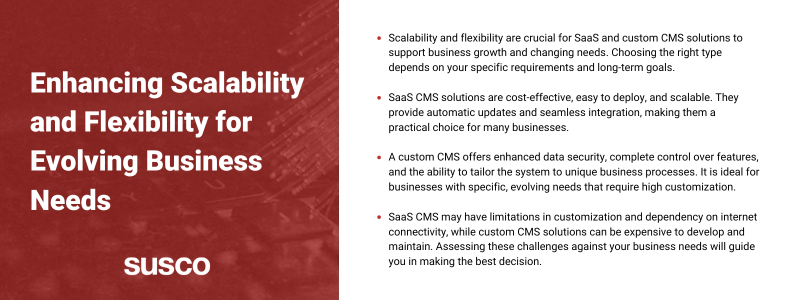
It is paramount to have a Claims Management System (CMS) that grows and adapts alongside your organization. Scalability ensures your system can handle increasing claims volumes without compromising performance, while flexibility allows for customization and integration with emerging technologies.
These attributes are technical necessities and strategic advantages, enabling businesses to respond swiftly to market changes, regulatory updates, and evolving customer expectations. As companies expand and their operational demands become more complex, a scalable and flexible CMS becomes essential for sustaining growth and maintaining a competitive edge.
This article shows how businesses leverage these capabilities to meet their evolving needs and drive long-term success, as well as how you can.
Understanding Scalability in CMS
As businesses evolve, the ability of their systems to scale becomes crucial. A Claims Management System (CMS) that can expand and adapt ensures that companies can grow without being held back by technical limitations.
Scalability in a CMS is not just about managing increased workloads but also about supporting broader business objectives.
Importance of Scalability for Business Growth
- Handling Increased Claim Volumes: A scalable CMS ensures your system can efficiently manage higher volumes of claims as your business grows, maintaining performance and reliability.
- Supporting Expansion into New Markets: Scalability allows your CMS to adapt to new market demands, facilitating seamless integration and operation across different regions and regulatory environments.
Examples of Scalable Features in CMS
- Cloud-Based Infrastructure: Enables on-demand resource allocation to handle peak loads without compromising performance.
- Modular Design: Allows for adding new functionalities and integrations easily as business needs evolve.
- Automated Workflows: Streamlines claim processing, reducing manual intervention and improving efficiency at scale.
- Data Analytics Capabilities: Supports real-time analysis and reporting, helping businesses make informed decisions as they grow.
Scalability in a CMS is essential for accommodating growth and ensuring that businesses can respond to increasing demands and new opportunities. Leveraging scalable features allows companies to maintain efficiency, improve performance, and achieve sustained growth in an ever-changing market landscape.
SaaS CMS: Scalability and Flexibility
Cloud-based infrastructures allow for dynamic resource allocation, enabling the system to handle varying loads efficiently without downtime.
Automatic updates and upgrades ensure the system stays current with the latest features and security enhancements, reducing maintenance burdens.
Seamless integration capabilities allow businesses to connect their CMS with various tools and platforms, enhancing functionality. A flexible CMS can be customized to fit unique business workflows, ensuring it meets specific operational needs.
Benefits Growing Businesses
SaaS models are cost-effective, offering lower upfront costs and predictable subscription fees, making them budget-friendly for businesses. They also support quick deployment and easy scalability, allowing businesses to adjust resources as needed. However, challenges in scalability and flexibility can arise, such as customization limitations, dependency on internet connectivity, and ensuring data security and compliance across different regions.
Despite the many advantages, SaaS CMS solutions can face challenges in meeting specific scalability and flexibility needs. Customization limitations and dependency on internet connectivity are common concerns. Ensuring data security and compliance across different regions can also present difficulties, requiring careful management and strategic planning.
By familiarizing themselves with these features and challenges, businesses can make informed decisions about implementing SaaS CMS solutions that support their growth and evolving requirements.
Custom CMS: Scalability and Flexibility
Custom CMS platforms offer scalability through customizable architecture, allowing businesses to design their systems to handle growth. Unlike off-the-shelf solutions, a custom CMS can be built to meet specific business needs, ensuring optimal performance as the company expands.
Flexibility in Custom CMS
A big advantage of a custom CMS is the complete control it provides over features and integrations. Businesses can modify and expand the system as their needs evolve, ensuring the CMS remains aligned with their operational processes and goals. This flexibility allows for seamless adjustments and incorporation of new functionalities without significant disruptions.
Benefits of Custom CMS for Growing Businesses
One of the primary benefits of a custom CMS is enhanced data security. Businesses can implement robust security measures specific to their requirements with a tailored system. Additionally, customization means the business gains precise configuration to support unique workflows and processes, providing a competitive edge.
Challenges of Custom CMS in Scalability and Flexibility
However, developing a custom CMS comes with challenges. The initial development costs can be high, and ongoing maintenance requires specialized expertise. Ensuring scalability might also be complex, as the system needs to be designed with future growth in mind from the outset. Balancing flexibility with stability can be difficult, requiring careful planning and regular updates to address evolving business needs.
While custom CMS solutions offer significant advantages in terms of scalability and flexibility, businesses must weigh these benefits against the potential challenges to determine the best approach for their growth and operational needs.
SaaS and custom CMS solutions offer unique advantages in scalability and flexibility, which are essential for businesses aiming to grow and adapt to a dynamic market. SaaS CMS provides cost-effectiveness, quick deployment, and effortless scalability, making it ideal for many companies.
On the other hand, a custom CMS offers unparalleled control, enhanced security, and high customization, catering to specific business needs. Each approach comes with challenges, such as customization limitations in SaaS, higher initial costs, and complexity in custom CMS.
When deciding between SaaS and custom CMS, consider your long-term business goals, budget, and specific operational needs. Investing in a solution that aligns with your growth strategy and provides the flexibility to adapt to changing demands will ensure sustained success.
Remember, the right CMS is not just a tool but a strategic asset that supports your business’s evolution and resilience in a competitive landscape.